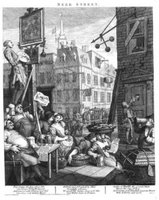Rod Dreher's blog is one of those that, while I certainly don't always agree with it, I keep on BlogLines just to see what is said. Thus, the other day I ran across
this post on spiritual fatherhood:
Not long ago, I thought about how rarely I have ever looked upon the pastor at any parish where I've been worshiping as any sort of spiritual father, or an authority figure in all but the minimal sense. That is, I've only been able to take him seriously as "magician or ritual functionary," because there is very little if anything fatherly about him. Clerics these days -- and I'm not just talking about Catholic priests, so cool your jets, you usual suspects -- too often comport themselves as Best Buddies, or mere Therapists. Maybe it's just me, but I've always thought that there was something really wrong, and ultimately undermining, about being part of a spiritual community that had no spiritual father....
Now, this is certainly not the first time that I've run into someone worrying that priests these days aren't filling their necessary roles as father to the parish. But since Dreher concluded his post with a request for comment from others on whether they felt they had experienced spiritual fatherhood in their churches (Catholic or otherwise) I started thinking, What exactly is 'spiritual fatherhood' anyway? Come to that, what exactly is 'fatherhood' or 'fatherliness' in the more general sense?
Lately I've been having a lot of odd memory moments in which, while dealing with the girls, some memory from my own early childhood suddenly comes back with the realization, "Oh, that must be what was really happening." In many ways, after just over four years on the job, I still feel like I'm just 'faking it' until I 'really' know how to be a father. Increasingly, however, I realize that this isn't just some introductory stage, this is the real thing. And indeed, when I expressed the feeling that I still hadn't figured fatherhood out to my own father, just a few months before his death, he replied that after 27 years he still felt like he was faking it as well. And the end of the day, fathers are just men who have kids. And we try to muddle on through and do the best job that we can at raising our children, setting a good example, bringing them up in the the love of God and Church, and teaching them however much or little we know.
This is not to say that 'fatherliness' is not an important attribute. It's just that I very much doubt that many people
feel fatherly in the stereotypical sense that many of us have culturally ingrained. That doesn't mean that your father should be "Best Buddies, or mere Therapists", but rather that as a father you often look fatherly to your children when you don't
feel fatherly yourself. Fatherliness is perhaps more a product of the difference in age, experience and understanding between father and child than it is a trait specifically possessed by the father himself. I try to explain things and mete out justice to my children as best I can, yet feel like I have none of the gravitas that my father did. Yet, it may well be that my children think I do. And that they, in turn, will feel like they are all at sea, muddling along as best they can, when it comes their turn to be parents.
How does all this apply to priests? Well, a priest has a far more difficult job, in that he's being asked to provide a sort of spiritual fatherhood to people who are often his own age, or indeed older. And a priest is, after all, at the human level just a guy who has been ordained. Certainly, becoming a priest must be a life-changing event (as is having a child) but at the same time a priest must look back to his youth and his childhood and think, "I'm not really a different person than I was before -- how can I possibly provide the 'fatherhood' that people expect of me?"
The answer, perhaps, is the same as for biological fathers: Muddling through. Trying to provide wisdom and discipline as needed. Being honest about your limitations, without taking the cowardly path of "I just don't know, you'll have to figure that out for yourself" unnecessarily. At the least, a priest can be an honest, prayerful and hard working man. Some parishioners, seeing the priest as being vastly more knowledgeable about the faith, may see in his teaching and guidance the image of a father (or more precisely, a dim reflection of The Father.) Others may see him as just another man, who (as we all do in different ways) has an important part to play in God's plan and Church.
Most of us, as we mature, come to see our parents not simply as The Parent but as people, with strengths, weaknesses, foibles and motivations not so very unlike our own. Indeed, the Bible acknowledges as much and more when it enjoins the son (in Ecclesiastes, is it?) to respect his father and mock him not, even if in age his wits should fail him. Thus, it should perhaps not be surprising that as adults we sometimes find it harder to experience our priests as fathers in the sense that we remember our fathers from childhood -- full of stern wisdom and justice, loved, feared, but often not fully understood.



